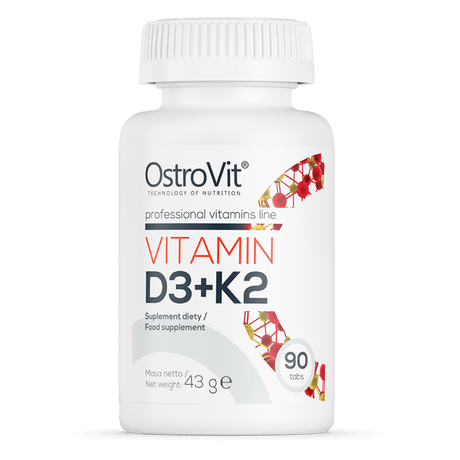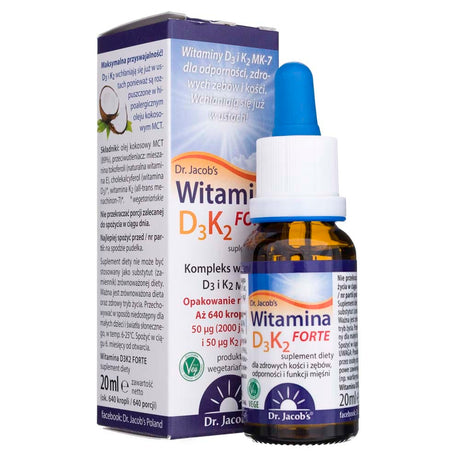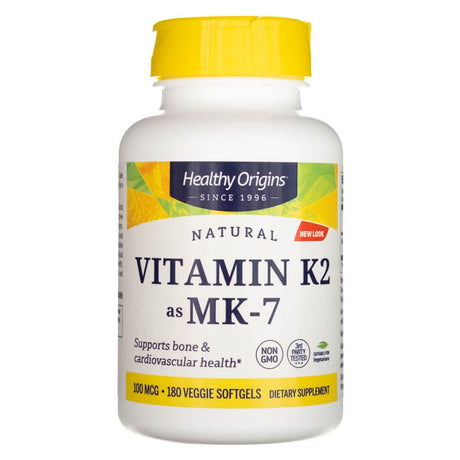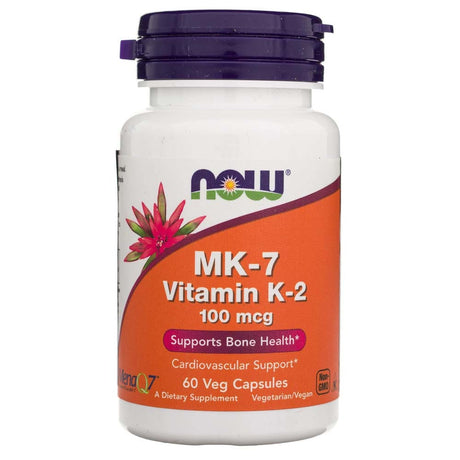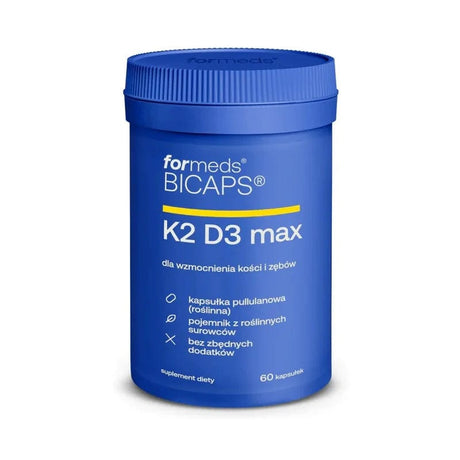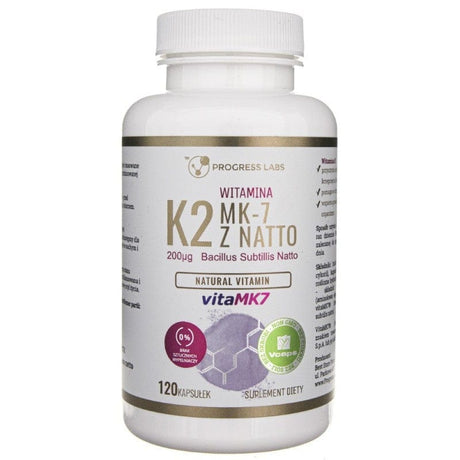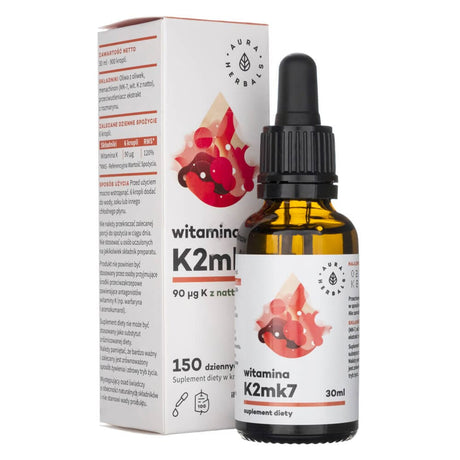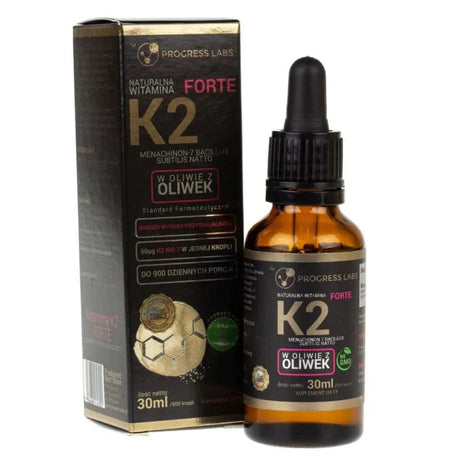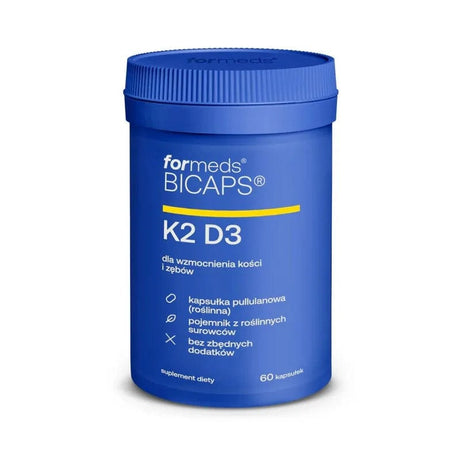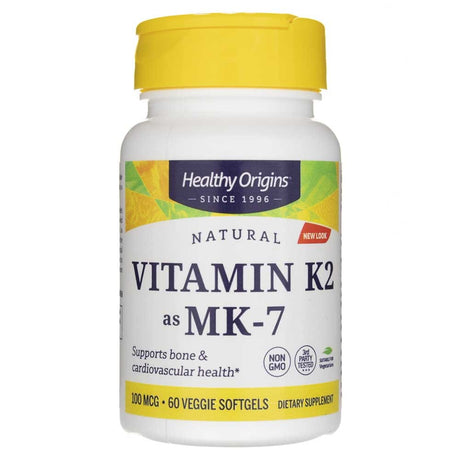Ostrovit
Ostrovit Vitamin D3 + K2 - 90 tabletter
Försäljningspris 31.12 kr Ordinarie pris 34.59 krEnhetspris0.35 kr varderaDr. Jacob's
Dr. Jacob's Vitamin D3+K2 FORTE, droppar - 20 ml
Ordinarie pris 274.09 krEnhetspris1,370.45 kr /100mlNow Foods
Now Foods Mega D-3 & MK-7 - 60 vegokapslar
Ordinarie pris 182.19 krEnhetspris3.04 kr varderaNow Foods
Now Foods Vitamin K2 MK-7 100 mcg - 120 vegokapslar
Ordinarie pris 277.29 krEnhetspris2.31 kr varderaHealthy Origins
Healthy Origins Vitamin K2 som MK-7 100 mcg - 180 softgels
Ordinarie pris 402.59 krEnhetspris2.24 kr varderaNow Foods
Now Foods Vitamin D-3 & K-2 – 120 kapslar
Ordinarie pris 111.79 krEnhetspris0.93 kr varderaNow Foods
Now Foods Vitamin K2 MK-7 100 mcg - 60 vegokapslar
Ordinarie pris 147.59 krEnhetspris2.46 kr varderaDr. Jacob's
Dr. Jacob's Vitamin D3+K2, droppar - 20 ml
Ordinarie pris 186.69 krEnhetspris933.45 kr /100mlAliness
Aliness Vitamin K2 Mono FORTE MK-7 200 mcg - 60 kapslar
Ordinarie pris 150.89 krEnhetspris2.51 kr varderaTrec Nutrition
Progress Labs Vitamin K2 Vita-MK7 200 mcg - 120 kapslar
Ordinarie pris 145.39 krEnhetspris1.21 kr varderaProgress Labs
Progress Labs Vitamin K2 MK-7 från Natto 100 mcg - 120 tabletter
Ordinarie pris 63.69 krEnhetspris0.53 kr varderaNow Foods
Now Foods Mega D3 4000 IE & MK-7 180 mcg - 60 kapslar
Ordinarie pris 178.99 krEnhetspris2.98 kr varderaAura Herbals
Aura Herbals Vitamin K2 MK-7 droppar - 30 ml
Ordinarie pris 106.19 krEnhetspris3,539.67 kr /lSolgar
Solgar Vitamin K2 MK-7 100 mcg - 50 vegokapslar
Ordinarie pris 234.89 krEnhetspris4.70 kr varderaAliness
Aliness Vitamin K2 FORTE MK-7 200 µg med Natto D3 - 60 kapslar
Ordinarie pris 165.39 krEnhetspris2.76 kr varderaWish Pharmaceutical
Wish Vitamin K2 MK-7 från Natto 100 mcg - 120 tabletter
Ordinarie pris 68.19 krEnhetspris0.57 kr varderaProgress Labs
Progress Labs Vitamin K2 MK-7 FORTE, droppar - 30 ml
Ordinarie pris 106.19 krEnhetspris35.40 kr /10mlHealthy Origins
Healthy Origins Vitamin K2 som MK-7 100 mcg - 60 softgels
Ordinarie pris 167.69 krEnhetspris2.79 kr varderaProgress Labs
Progress Labs Vitamin K2 MK-7 från Natto 100 mcg + D3 2000 IU 50 mcg - 120 tabletter
Ordinarie pris 70.39 krEnhetspris0.59 kr vardera
Vitamin K: Ett viktigt näringsämne för blodkoagulering och mer
Vitamin K:s betydelse sträcker sig långt bortom dess välkända roll i blodkoaguleringen. Detta viktiga näringsämne påverkar olika vävnader i hela kroppen, och spelar en viktig roll för att upprätthålla den allmänna hälsan. Trots dess betydelse, är allmänhetens medvetenhet om vitamin K fortfarande begränsad. Låt oss utforska hur K-vitamin påverkar människokroppen och vem som kan riskera brist.
Egenskaper, Egenskaper, och användningsområden för K-vitamin
K-vitamin avser en grupp av strukturellt liknande fettlösliga föreningar. Det finns två primära former:
- Vitamin K1 (fyllokinon) : Härrör från växtkällor
- Vitamin K2 (menakinon) : Finns i animaliska produkter och fermenterade livsmedel
Kroppen behåller normalt endast 30-40% av det intagna K-vitaminet. Även om små mängder cirkulerar i blodet och fördelas i hela kroppen (inklusive hjärnan, hjärtat, bukspottkörteln, och skelettet ), är levern den primära lagringsplatsen, om än i begränsade mängder.
Källor till K-vitamin i kosten
K-vitamin finns i olika livsmedel, inklusive:
- Vegetabiliska oljor (solros, raps)
- Gröna grönsaker (spenat, sparris, broccoli, brysselkål), groddar)
- Nötter
- Frukt (kiwi, björnbär, blåbär, granatäpple, vindruvor)
- Spannmål
- Mejeriprodukter (ost, mjölk, kefir)
- Ägg
- Kött (särskilt nötlever, fjäderfä)
- Fisk
Vitamin K:s effekter på kroppen
Forskning har visat att vitamin K är nödvändigt för många fysiologiska processer:
- Metabolism i blodkärl och benvävnad
- Celltillväxt och apoptos
- Förebyggande av vaskulär förkalkning
- Förkalkning av mjukvävnad
- Förkalkning av
- Upprätthållande av kalciumbalansen
- Celladhesionsprocessen
K-vitamin är särskilt viktigt för personer som löper risk att drabbas av hjärt-kärlsjukdom.
Betydelsen av K-vitamin för nyfödda, spädbarn, och barn
K-vitamin spelar en avgörande roll för att skydda nyfödda från blödningssjukdomar som orsakas av brist. Dessa tillstånd drabbar ofta spädbarn under tre månader och visar sig i två faser:
- Den första fasen inträffar snabbt, vanligtvis 3-5 dagar efter födseln, med symtom som blödningar från mag-tarmkanalen, slemhinnor, navelregionen, och huden.
- Det senare stadiet (2-12 veckors ålder) leder främst till intrakraniell blödning, som har hög dödlighet.
Tidiga symtom på livshotande blödning kan inkludera:
- Kronisk diarré och kräkningar
- Långvarig gulsot
- Otillräcklig (eller ingen) viktuppgång
- Mindre/måttlig blödning (från naveln, slemhinnor, matsmältningskanalen)
Tillskott av K-vitamin i rätt tid kan eliminera risken för dessa tillstånd. För äldre barn och ungdomar, K-vitamin har samma funktioner som hos vuxna men är ännu viktigare på grund av den snabba tillväxten och utvecklingen.
K-vitaminbrist: Symtom och riskfaktorer
K-vitaminbrist kan leda till allvarliga hälsokonsekvenser, inklusive ökad risk för osteoporos, ateroskleros, och neurodegenerativa sjukdomar. Vanliga symptom inkluderar:
- Blödning från slemhinnor
- Förlängd blodkoaguleringstid
- Känslighet TiB för blåmärken
- Hematuri
- Ökad sårläkningstid
Personer med högre risk för K-vitaminbrist
K-vitaminbrist kan drabba alla, men vissa faktorer ökar risken:
- Gastrointestinala störningar som påverkar absorptionen (Crohns sjukdom, celiaki, kronisk pankreatit)
- Mediciner som stör absorptionen av K-vitamin (antacida, blodförtunnande medel, salicylsyraderivat, kolesterolkolesterolsänkande medel)
- Långvarig an TiB iotisk behandling
- Undernäring
Kontraindikationer och försiktighetsåtgärder
Även om vitamin K i allmänhet anses vara säkert, kan det interagera ogynnsamt med vissa läkemedel, särskilt antikoagulantia:
- Warfarin, tioklomarol
- Medel som används för att förebygga och behandla tromboemboliska sjukdomar (t.ex.g., fenprocoumon, acenocoumarol)
Försiktighet bör iakttas vid användning av vitamin K-tillskott till personer med ärftlig hypoprothrombinemi, nedsatt njurfunktion, överdriven antikoagulation på grund av hepariner, eller överkänslighet mot vitamin K.
Att förstå betydelsen av vitamin K och upprätthålla adekvata nivåer genom kost eller tillskott kan avsevärt bidra till allmän hälsa och välbefinnande, särskilt när det gäller blodkoagulation, benhälsa, och kardiovaskulär funktion.
